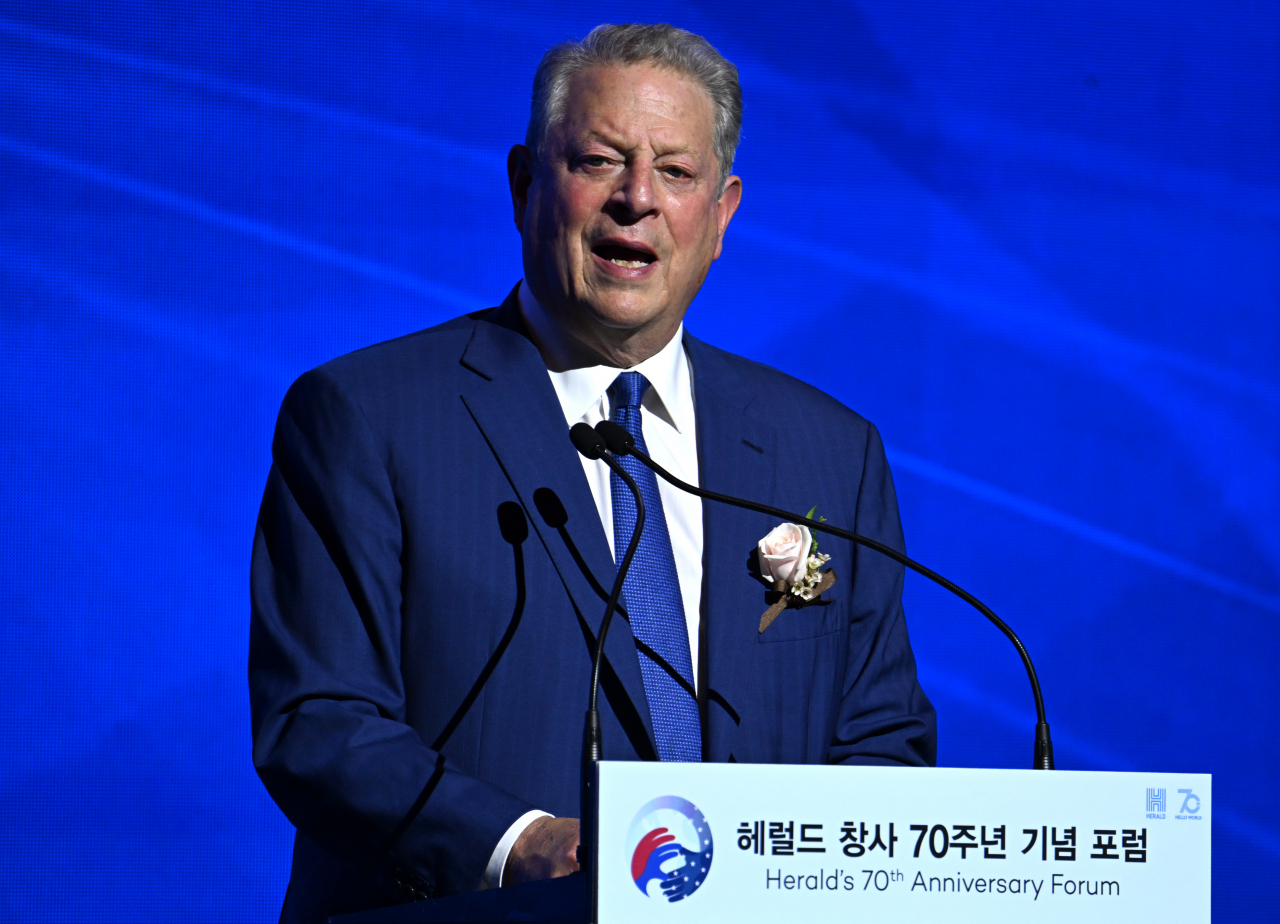 |
Former US Vice President Al Gore gives a keynote speech at the "Alliance Plus" forum hosted by Herald Corp. on Wednesday at the Shilla Seoul. (Im Se-jun /The Korea Herald) |
Former US Vice President and environmentalist Al Gore called for bigger climate ambitions on the part of South Korea and the US at the “Alliance Plus” forum hosted by Herald Corp. on Wednesday in commemoration of the 70th anniversary of the two countries’ alliance and the founding of The Korea Herald.
Korea and the US are already working on clean energy technologies that are driving what Gore referred to as the emergent "sustainability revolution" -- the paradigm shift towards norms, actions and policies valuing sustainability -- and the partnership between the two countries in areas like batteries has already helped develop many climate solutions that are now ready for wide-scale deployment, he said.
But “Korea is currently lagging far behind the rest of the world in the deployment of wind and solar, which generated only 5.4 percent of Korea’s electricity in 2022, which is less than half the global average of 12 percent,” Gore said in a keynote speech titled, “The Role of ROK-US Solidarity in Addressing Our Planet’s Greatest Challenges,” at the forum held at the Shilla Seoul.
“So I respectfully urge Korea to have greater climate ambitions. The world needs your leadership. The US needs to do more too," the former vice president said.
In both Korea and the US, fossil fuels still account for more than 60 percent of total electricity generation. To achieve their goal of achieving net-zero emissions by 2050, the two countries must cut emissions in half by 2030, he said.
Gore also noted that the Korea-US alliance has evolved from a strategic defense partnership into a relationship that has bolstered the security of the Pacific region, advanced global innovation and expanded economic opportunities and prosperity in both nations based on shared values.
“Indeed, the primary objective of our strategic relationship has always been the safety and security of the Korean people. The longstanding commitments of both of our nations to deterrence and nuclear non-proliferation remain essential in maintaining peace and stability, particularly in the face of an evolving threat from North Korea,” he said.
“But in the seven decades since establishing the alliance, it is ever clearer that what unites us is not simply our shared strategic defense priorities, but a set of shared values – our mutual commitment to advancing freedom, democracy and human rights. It is because of those shared values that the alliance has flourished and the Republic of Korea has grown into a respected and consequential world power.”
Now, the allies face challenges such as the continuing danger of war, pandemic prevention, economic and social inequality, autocratic threats to pluralism and representative democracy and harnessing the potential of generative artificial intelligence while protecting humanity against its dangers, he said.
Gore stressed that the global climate crisis is the one significant challenge that intersects with every priority of the alliance. He won the Nobel Peace Prize in 2007 jointly with the United Nations' Intergovernmental Panel on Climate Change for their efforts to increase public knowledge about human-caused climate change.
Mentioning the record-high temperatures last month in Vietnam, Laos and Thailand; mega-fires in Alberta, Canada; Argentina’s current worst-ever drought; the rain bombs Korea experienced last August; Typhoon Hinnamnor last September; and deadly flooding and landslides in Congo, he said the climate crisis is a national security issue, a threat to global economic prosperity, and it is driving inequality.
With 32 million people displaced worldwide by extreme weather last year, and air pollution killing millions of people every year, he warned that higher temperatures caused by the glut of carbon dioxide are spreading tropical diseases such as dengue fever, the Zika virus and malaria to higher latitudes.
“But the good news is that, conversely, the transition to net-zero is the greatest economic opportunity in all of history … The sustainability revolution that is taking hold is occurring at the scale of the industrial revolution, but at the speed of the digital revolution,” Gore said, elaborating on the progress made in renewable energy such as solar power and electric vehicles.
“Korea has huge potential to profitably replace existing coal and gas power generation with solar and wind, which are already cheaper than building new gas-fired power plants," he stressed.
By 2024, solar will be cheaper than existing gas generating plants, and by 2025, new offshore wind will be cheaper than existing gas plants while new solar generation plus batteries will be cheaper than electricity produced by new gas-powered plants, Gore added.
“This is not only important to reduce global warming pollution and disease-causing particulate air pollution. It is an important strategy for increasing energy security for Korea, which is the fourth-largest importer of coal in the world,” he said.







![[Today’s K-pop] Blackpink’s Jennie, Lisa invited to Coachella as solo acts](http://res.heraldm.com/phpwas/restmb_idxmake.php?idx=644&simg=/content/image/2024/11/21/20241121050099_0.jpg)